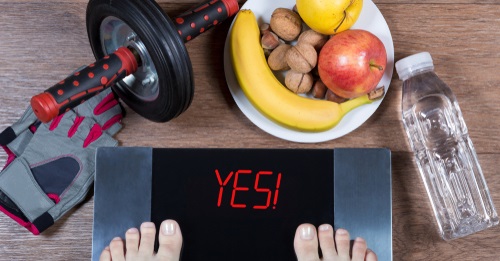Lose Fat and Gain Muscle: Impossible at the Same Time?
The most important question that any personal trainer will ask of a potential new client is: “What are your goals?”.

And though I can’t speak for all personal trainers everywhere, perhaps the most common answer that I have received in response is: “lose fat and tone/firm muscle”.
And this is a completely legitimate goal—it’s my goal too! But I fear that such a goal will oftentimes lead to disappointment.
Lose Fat and Gain Muscle
Why? Because while it is absolutely possible to lose fat and gain muscle, it is really, really hard to do both at the same time.
Your body doesn’t really care that social media personalities and those random ads at the bottom of your YouTube videos have promised that their tea/workout/’One Weird Ingredient’ will simultaneously dissolve fat from your body while giving you the muscular size and strength of The Hulk.
Generally, our bodies operate in this way: in times of feast (aka calorie surplus), our bodies will gain in fat and muscle. In times of famine (aka calorie deficit), our bodies will lose fat—and muscle. So, if you’re pumping iron at the gym, lifting heavy and working hard, while also cutting calories, you’re going to have a really, really hard time building muscle—you will also likely experience a much slower recovery time and find it very difficult to maintain your energy levels…and which are common symptoms of burnout or over-training. And if you do the opposite—remain inactive while eating a calorie surplus—you are likely to gain fat, not muscle.
All of this being said, it is not impossible to maintain muscle while losing fat—but it takes a lot of knowledge and precision. This is where a qualified professional would be absolutely integral; your body is unique in its needs and in its limits, and an elite personal trainer or other fitness and nutrition expert can tailor a meal plan and a workout regimen to your goals, lifestyle, and body. I also feel obliged to note that you should definitely consult your physician or other health professional before starting any kind of major nutrition change or exercise regimen.
But, besides hiring a qualified personal trainer or nutritionist, what are some general principles that you can follow to help you to hold onto your hard-earned muscle—while also remaining healthy and lean? And what are some of the most dangerous pitfalls that might prevent you from reaching your goal?
1) Don’t go too low with your calories!
One common mistake that I see people make all the time is to cut their calories drastically and, at the same time, commit to an intense strength-training routine. You need to eat—especially when putting your body under an additional stress. You will never gain strength or muscle size if you lack the fuel (i.e. your food) to do the work.
2) On the flip side—don’t eat too much!
Are you confused yet? Maybe you don’t know how many calories your body needs to maintain your ideal body weight. And if that’s the case, you can check out these calculators that can give you a general idea of your body’s energy requirements. An activity tracker might be better at giving you a more precise estimation of your daily calorie expenditure.
But, typically, people tend to underestimate the amount of calories they consume and overestimate how many calories they burn. It is definitely worth the time to educate yourself on what you’re eating, and whether or not your food is getting you closer to–or further from–your goal.
3) Get enough protein
It’s not all about calories in, calories out! So, why is protein so essential? Research has shown that protein provides the necessary ingredients for building and maintaining your muscle, even when in a calorie deficit. Other studies have also shown that protein requirements are greater for physically-active individuals. It is also much harder for your body to turn protein into fat than, say, it is to turn carbohydrates into fat–plus, it is much more satiating, and will keep you feeling fuller for longer.
4) Is sugar sabotaging you?
The popular North American diet just loooves its sugar and refined carbohydrates—and refined carbohydrates, as you may or may not know, turn into sugar in your body, which, conversely, turns into fat on your body. And though carbohydrates aren’t evil, and are actually necessary for life, research has shown the importance difference between the type and quality of the carbohydrates that you’re consuming. Some carbohydrates will keep you satiated and your energy levels stable–others will spike your insulin levels, sour your mood and lower your energy levels, and keep you coming back for more!
5) Lift those weights—and lift hard!
This is a big one! If you want to maintain muscle while in a calorie-deficit, you need to keep those muscles engaged and stressed (in a good way). Dieting alone might help you lose weight—but a greater proportion of that weight is likely to come from your lean mass, i.e. your muscles. So, make sure you continue to strength-train with intensity. A good rule of thumb is this: you should be struggling on the last few reps–even if you don’t go to failure.
6) But don’t forget cardio!
Lots of bodybuilders, when they’re looking to cut fat, will increase their cardio volume. Why is this? Because as much as people love to hate cardio, it is certainly effective in torching those unwanted calories. However, cardio to an excess (anything over an hour, as agreed by most experts), can start to work against you and start depleting your hard-earned muscle!
7) Prioritize recovery
Recovery is integral to success, even during the times when you are eating in a caloric surplus. It becomes even more essential, however, when you are continuing to work out whilst eating in a caloric deficit. So, take your rest days and sleep, sleep, sleep; I cannot understate the importance of sleep. Sleep is when your muscles recover and grow and when your energy levels are restored. Without it, you’ll likely find strength gains that much harder to come by, your appetite heightened (sugar cravings, anyone?), and fat that much more stubborn.
Also necessary for optimal recovery is appropriate nutrition pre- and post-workout! Exercising on an empty stomach–and not eating afterwards–can lead to depleted glycogen stores and reduced muscle protein synthesis, and even muscle loss!
Knowledge and precise application is required to be successful in a fat loss and muscle-gaining campaign. I know it can all seem overwhelming–but don’t worry, there are those for whom your success is their business! An elite Infofit personal trainer will apply their considerable wealth of knowledge and skills–all backed by science–to making sure you reach your goal.
Wishing you all the best on your journey to optimum health!
Written by Theresa Faulder, Master’s in English, Certified Personal Trainer, and Infofit fitness blog writer.
Works Cited
Douglas Paddon-Jones, Eric Westman, Richard D Mattes, Robert R Wolfe, Arne Astrup, Margriet Westerterp-Plantenga; Protein, Weight Management, and Satiety, The American Journal of Clinical Nutrition, Volume 87, Issue 5, 1 May 2008, Pages 1558S–1561S, https://doi.org/10.1093/ajcn/87.5.1558S
Wylie‐Rosett, J., Segal‐Isaacson, C. and Segal‐Isaacson, A. (2004), Carbohydrates and Increases in Obesity: Does the Type of Carbohydrate Make a Difference?. Obesity Research, 12: 124S-129S. doi:


